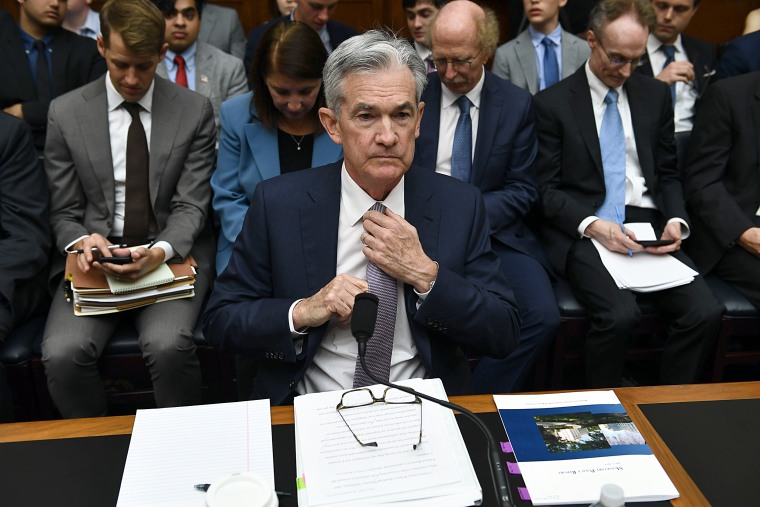Federal Reserve Chairman Jerome Powell might be willing to stand up to the White House, but is reluctant to rock the boat on Wall Street.
In his Congressional testimony on Wednesday, Powell reaffirmed the strength of the U.S. economy — but much of the focus was on the “crosscurrents” and “challenges” he cited, characterizations market observers broadly interpreted as a signal that the central bank will cut interest rates by a quarter of a percentage point at its July meeting.
“Markets are fully expecting a rate cut at month end and Powell did nothing to dissuade that,” said Greg McBride, chief financial analyst at Bankrate.
“His comments today really reiterated a step, a move closer towards more accommodative policy,” said Charlie Ripley, senior investment strategist at Allianz Investment Management. “In our view, that’s moving closer to the idea of these insurance rate cuts.”
Although he reiterated that the expectation of economic growth remains “solid,” Powell indicated that softer data raised fears of a slowdown. Since the Fed’s last statement in June, “It appears that uncertainties around trade tensions and concerns about the strength of the global economy continue to weigh on the U.S. economic outlook,” he said. Powell expressed concern about slower global growth, trade issues, Brexit and the debt ceiling, along with “important longer-run challenges” like lagging labor force participation and productivity growth, as well as the “longer-term effects of high and rising federal debt.”
“It sounds very dovish,” said Zhiwei Ren, managing director and portfolio manager at Penn Mutual Asset Management. “They’re trying to find a reason to cut. They’re trying to justify the cut. You can see this rhetoric all over the statement… His emphasis is always on the negatives,” he said.
Despite a robust June employment report, economists noted that Powell’s testimony largely dismissed this, saying the Fed is correct to look at data that reveals a less rosy picture.
“Nonfarm payrolls are slowing,” said Dan North, chief economist at Euler Hermes North America. “Employment is a lagging indicator, and they’ve got to look forward,” he said, adding that some economic data wasn’t as positive as it first appeared. “The first quarter GDP report was pretty skewed by inventories and net exports,” he said.
Trade also emerged as a major concern. Although the Fed’s June statement didn’t mention the topic at all, Powell’s testimony today mentioned it eight times.
"You have tremendous uncertainty caused by the U.S.-China trade conflict,” Ren said. “Business investment is a huge driver of economic growth,” he added, but Powell noted that this had dropped as of late — a trend attributable to the unwillingness of companies to sink money into initiatives that could be undercut by soaring tariffs or disrupted supply chains.
Analysts also said Powell wanted to avoid injecting volatility into financial markets more generally, since market expectations for a July rate cut are at 100 percent. Although not officially part of the Fed’s mandate, experts said it had little choice but to deliver on this expectation.
“There’s been a tremendous amount of uncertainty particularly relating to the global trade front,” Ripley said. “I would say at least at this point there will be a little bit more confidence in the market.”
“The stock market in particular is behaving like a kid who’s throwing a temper tantrum,” McBride said. “The market wants a rate cut and they want it now.”
Powell also responded to President Donald Trump's ongoing criticism of his leadership, affirming the Fed’s autonomy and stressing, more than once, that the Fed will "always focus on doing the job that you have assigned us." He dismissed the notion that emotion would play into any rate decision, saying that monetary policy is guided by rational, analytical data parsing.
“It’s reassuring to markets that Powell is staunchly defending the Fed’s independence," said McBride. "Any waffling on that could undermine the Fed’s credibility and be a risk to markets.”
